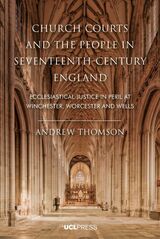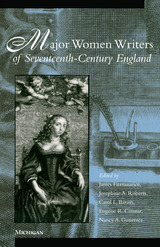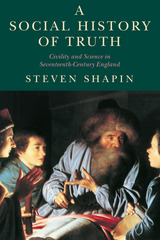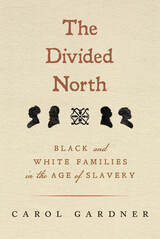4 books about Seventeenth - Century Engl

Church Courts and the People in Seventeenth-Century England
Ecclesiastical Justice in Peril at Winchester, Worcester and Wells
Andrew Thomson
University College London, 2022
An exploration of the regulatory and coercive roles played by church courts in England during the seventeenth century.
Religion meant far more in early modern England than church on Sundays, a baptism, a funeral, or a wedding ceremony. The Church was fully enmeshed in the everyday lives of the people, their morals, and religious observance. It imposed comprehensive regulations on its flock focused on such issues as sex before marriage, adultery, and receiving the sacrament, and it employed an army of informers and bureaucrats, headed by a diocesan chancellor, to enable its courts to enforce the rules. Church courts lay, thus, at the very intersection of Church and people. This book offers a detailed survey of three dioceses across the whole of the century, examining key aspects such as attendance at court, completion of business, and, crucially, the scale of guilt to test the performance of the courts. For students and researchers of the seventeenth century, it provides a full account of court operations, measuring the extent of control, challenging orthodoxies about ex-communication, penance, and juries, contextualizing ecclesiastical justice within major societal issues of the times, and, ultimately, presents powerful evidence for a “church in danger” by the end of the century.
Religion meant far more in early modern England than church on Sundays, a baptism, a funeral, or a wedding ceremony. The Church was fully enmeshed in the everyday lives of the people, their morals, and religious observance. It imposed comprehensive regulations on its flock focused on such issues as sex before marriage, adultery, and receiving the sacrament, and it employed an army of informers and bureaucrats, headed by a diocesan chancellor, to enable its courts to enforce the rules. Church courts lay, thus, at the very intersection of Church and people. This book offers a detailed survey of three dioceses across the whole of the century, examining key aspects such as attendance at court, completion of business, and, crucially, the scale of guilt to test the performance of the courts. For students and researchers of the seventeenth century, it provides a full account of court operations, measuring the extent of control, challenging orthodoxies about ex-communication, penance, and juries, contextualizing ecclesiastical justice within major societal issues of the times, and, ultimately, presents powerful evidence for a “church in danger” by the end of the century.
[more]

Major Women Writers of Seventeenth-Century England
James Fitzmaurice, Carol L. Barash, Eugene R. Cunnar, Nancy A. Gutierrez, and Josephine A. Roberts, Editors
University of Michigan Press, 1997
Many would find it difficult to name a woman writer in England before Jane Austen, even though women were writing as early as the time of Chaucer. It was during the seventeenth century, however, that women writers ceased to be viewed as odd or remarkable and became accepted as regular and often respected members of the literary world. The enormous commercial and artistic success of Aphra Behn's plays on the London stage of the 1670s and '80s marked the end of the time where only men were literary luminaries. Major Women Writers of Seventeenth-Century England brings together in one volume a rich assortment of writing by the women Behn influenced, as well as those who preceded her. Collected are works by Aphra Behn, Elizabeth Cary, Margaret Cavendish, Anne Finch, Aemelia Lanyer, Katherine Philips, Ester Sowernam, Rachel Speght, and Mary Wroth.
The texts included are newly edited and rely on the best manuscripts and editions of the time. They are accompanied by clear introductions, helpful explanatory notes, and a range of illustrations from the period. The book will appeal to all those with an interest in the rich literary record of the period.
Editors: James Fitzmaurice, Northern Arizona University; Josephine A. Roberts, Louisiana State University; Carol L. Barash, Seton Hall University; Eugene R. Cunnar, New Mexico State University; and Nancy A. Gutierrez, Arizona State University.
The texts included are newly edited and rely on the best manuscripts and editions of the time. They are accompanied by clear introductions, helpful explanatory notes, and a range of illustrations from the period. The book will appeal to all those with an interest in the rich literary record of the period.
Editors: James Fitzmaurice, Northern Arizona University; Josephine A. Roberts, Louisiana State University; Carol L. Barash, Seton Hall University; Eugene R. Cunnar, New Mexico State University; and Nancy A. Gutierrez, Arizona State University.
[more]

Reading, Gender and Identity in Seventeenth-Century England
Hannah Jeans
University of London Press, 2025
A fresh and complex analysis of the identity of the woman reader in seventeenth-century England.
This ambitious and interdisciplinary book redraws the history of early modern Englishwomen’s reading, exploring the connections between gender, reading habits, and genre throughout the seventeenth century. Reading, Gender and Identity in Seventeenth-Century England challenges accepted historiographical narratives about reading that have privileged male experience and the impact of the Civil War; the book highlights the multiplicity and complexity of women’s reading practices, focusing on how women used reading in constructing their gender identity. Reading was a gendered act in the early modern period; across genres, women were depicted negotiating a range of gendered behavioral norms. From religious texts, romances, and cookbooks, to news, household records, and scientific and medical treatises, Jeans draws on archival sources across a wide range of writing types to offer a more complete picture of women’s reading experiences, ultimately questioning the accepted notion of the woman reader itself.
This ambitious and interdisciplinary book redraws the history of early modern Englishwomen’s reading, exploring the connections between gender, reading habits, and genre throughout the seventeenth century. Reading, Gender and Identity in Seventeenth-Century England challenges accepted historiographical narratives about reading that have privileged male experience and the impact of the Civil War; the book highlights the multiplicity and complexity of women’s reading practices, focusing on how women used reading in constructing their gender identity. Reading was a gendered act in the early modern period; across genres, women were depicted negotiating a range of gendered behavioral norms. From religious texts, romances, and cookbooks, to news, household records, and scientific and medical treatises, Jeans draws on archival sources across a wide range of writing types to offer a more complete picture of women’s reading experiences, ultimately questioning the accepted notion of the woman reader itself.
[more]

A Social History of Truth
Civility and Science in Seventeenth-Century England
Steven Shapin
University of Chicago Press, 1994
How do we come to trust our knowledge of the world? What are the means by which we distinguish true from false accounts? Why do we credit one observational statement over another?
In A Social History of Truth, Shapin engages these universal questions through an elegant recreation of a crucial period in the history of early modern science: the social world of gentlemen-philosophers in seventeenth-century England. Steven Shapin paints a vivid picture of the relations between gentlemanly culture and scientific practice. He argues that problems of credibility in science were practically solved through the codes and conventions of genteel conduct: trust, civility, honor, and integrity. These codes formed, and arguably still form, an important basis for securing reliable knowledge about the natural world.
Shapin uses detailed historical narrative to argue about the establishment of factual knowledge both in science and in everyday practice. Accounts of the mores and manners of gentlemen-philosophers are used to illustrate Shapin's broad claim that trust is imperative for constituting every kind of knowledge. Knowledge-making is always a collective enterprise: people have to know whom to trust in order to know something about the natural world.
In A Social History of Truth, Shapin engages these universal questions through an elegant recreation of a crucial period in the history of early modern science: the social world of gentlemen-philosophers in seventeenth-century England. Steven Shapin paints a vivid picture of the relations between gentlemanly culture and scientific practice. He argues that problems of credibility in science were practically solved through the codes and conventions of genteel conduct: trust, civility, honor, and integrity. These codes formed, and arguably still form, an important basis for securing reliable knowledge about the natural world.
Shapin uses detailed historical narrative to argue about the establishment of factual knowledge both in science and in everyday practice. Accounts of the mores and manners of gentlemen-philosophers are used to illustrate Shapin's broad claim that trust is imperative for constituting every kind of knowledge. Knowledge-making is always a collective enterprise: people have to know whom to trust in order to know something about the natural world.
[more]
READERS
Browse our collection.
PUBLISHERS
See BiblioVault's publisher services.
STUDENT SERVICES
Files for college accessibility offices.
UChicago Accessibility Resources
home | accessibility | search | about | contact us
BiblioVault ® 2001 - 2025
The University of Chicago Press









